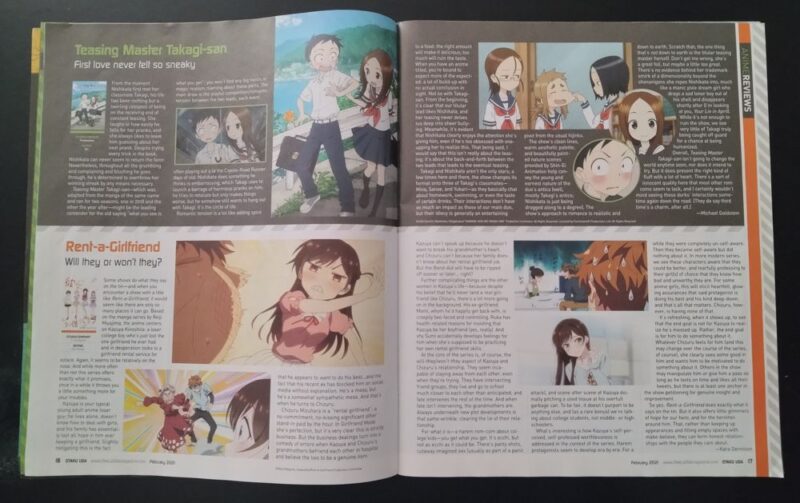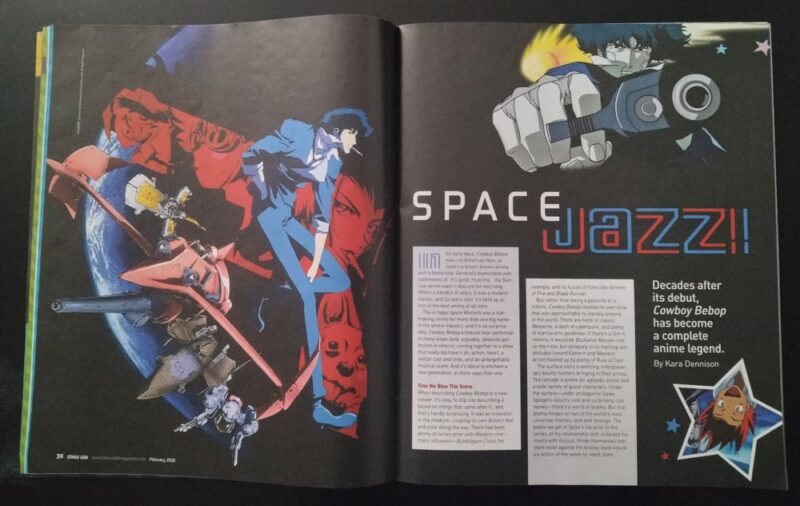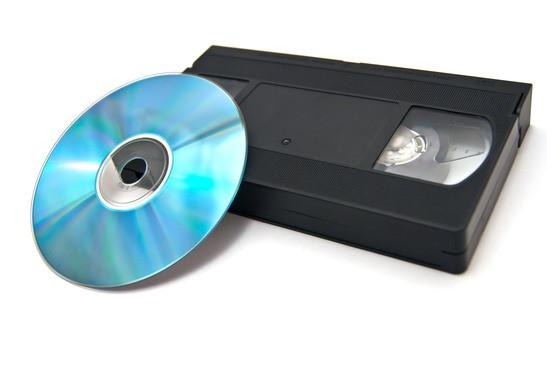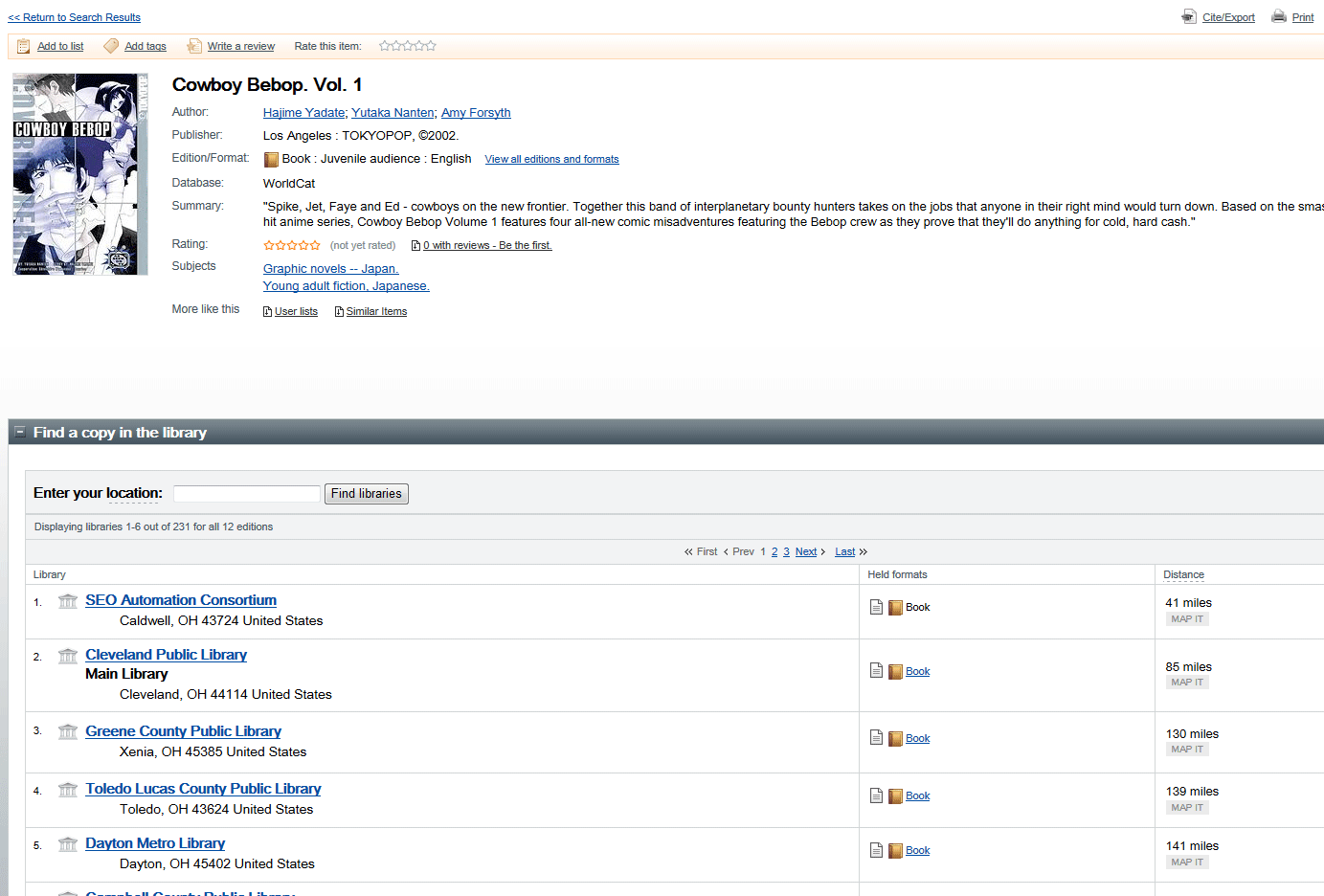
Physical magazines have increasingly been going extinct. As far as I know, Otaku USA is the last-standing physical magazine that covers anime and manga in the US. At my library, the children’s department uses the magazine to help their manga ordering. The magazine reviews manga, anime, and video games as they release here in the States. The magazine’s coverage is a little behind the streaming seasons, especially now that simulcast is common. But the magazine covers a variety of titles, not just the titles with the most online buzz.
The magazine also contains interviews with cosplayers and creators. It offers look-backs, such as the Cowboy Bebop article you see in my photo below, and even Japanese film articles. Articles are well-written, and as you can expect, most of the reviews are recommendations. Otaku USA reminds me of a periodical I carry at the library named Book Page. Neither are overly critical; rather, the magazines aim at introducing upcoming releases to readers. The Internet is a great resource, but it is a deluge. Sometimes having someone else sort through the stream helps, and that’s the role Otaku USA and Book Page serve. In the library world, we call this reader’s advisory, and it’s becoming a lost art. There used to be many magazines dedicated to this. People would get to know the tastes of regular reviewers and follow their recommendations toward new discoveries. There’s also conversation as readers of the same periodical discuss the recommendations. With the Internet, finding people who share the same source for discussion has become pretty rare. At my library, patrons will pull out Book Page and talk about the books and the reviews within it. Otaku USA, if more rarely, does the same for the local manga readers.

Not everything the Internet offers surpasses the old way of doing things. When it comes to reader’s advisory, curated offerings can save you time. They reduce the information overload we all contend with too. Plus there’s pleasure in perusing a magazine and marking things you find interesting. The Internet lacks such pleasures. There’s a mechanicalness to bookmarking pages in a web browser compared to dog-earing a magazine. Perhaps it’s because I straddle the analog and digital eras that I have a fondness for those older methods. Granted, I don’t want to go back to some older methods, such as typing on a mechanical typewriter. But when it comes to magazines and even newspapers, there’s much to be said about the old, physical way of doing things.

Otaku USA offers a preview chapter for upcoming manga in the center of every issue. This offers a nice way to get into a series you may not consider. This ties into the benefits curation can give you: something you wouldn’t consider trying.
Pictures dominate the magazine, and it has a layout that pulls your gaze across the articles. Unlike most magazines, Otaku USA doesn’t teem with advertisements. When you pick it up, subscription leaves don’t go flying either. In the issue I used as a base, I counted only 9 advertisements. Most of them were full-page ads instead of the in-article advertisements that break up articles in other magazines. Although, you could argue the magazine itself is an advertisement. I consider reader’s advisory different from advertising.
The magazine covers video games across all the major consoles. There’s a surprising amount of content stuffed into the magazine’s 100+ pages. I was surprised to see a movie release article that covered the rather obscure film Warning from Space. The coverage covered 2 pages, which if you know anything about magazines and newspapers, is a lot of space.
Now if you aren’t into physical media, Otaku USA offers a digital version. I also have to note that the company didn’t offer me anything for this review. I’ve carried the magazine for several years at my library, and it has proven itself useful for our purchasing and for reader’s advisory. Many of the library’s manga fans also use the magazine for their drawing practice.
Like all magazines, your interest in each month’s issue will vary, but there’s much to be said about this older way of keeping updated with releases. Sure, you can follow MyAnimeList and other online sources. However, you miss out on the pleasures of perusing a magazine and the anticipation of receiving one every 2 months. Anticipation enhances your enjoyment in surprising ways. You miss out on the benefits curation can provide: namely, the filtering of the information deluge. Don’t underestimate how much time this filtering can free. Time you can use for your interests or for actually reading manga. Physical media also has an immediacy digital lacks. It sounds strange, but it’s easier to reference a page in a physical book than to find the reference in a video or on some website. Pull out the magazine, flip to your dogear. We often forget we live in physical bodies and so navigate information in a physical way. That’s part of why reading books, newspapers, and magazines offer the better information retention than reading on a screen.
Otaku USA mails 6 issues a year (as of writing this article) for $19.95 for the first year.




Thank you for this post! I’ve wanted to divest myself from social media, which means I need to gather anime news from more traditional sources. I ordered a print version of Otaku USA. Here’s to taking back control of consumption habits!
Since moving away from social media, how do you feel?
The amount of decontextualized content I absorbed in social media was overwhelming: snippets of conversation, fan art, commentary on news I never bothered to read, notifications about product releases, etc. So, I’m reading more articles and long form content. It’s nice to move away from gamified social platforms. Part of me is nostalgic for the “anime blogosphere” I enjoyed in the 2010s.
Not to sound morbidly ironic, but I wonder if a utility like AI could be used to help writers get back to that 2010s anime blogosphere that you reminisce about, by helping “people” (who knows how long that will even be a thing) REcontextualize information into more meaningful longer-form content.
It would be so helpful for processing about each topic in the round, like a very well-read art critic, to a deeper degree which you don’t get from all the atomized disparate info dumbing us down on our techknowledgery.
– I think an apt metaphor for this would be all those contemporary talking videos that are splitscreened with some other totally unrelated, soundless movie, like a car driving or someone hammering nails into a board, all to keep the attention of people’s ADHD brains long enough to able to actually listen to the person talking on the camera.
Since the goal is to get people back to longer, deeper, broader and more nuanced information diets, the potential for AI to help strategize the informing medium’s format – much like a magazine’s little tangential call outs and blurbs scattered throughout a separate, longer article – has massive untapped potential for whatever human or AI publisher takes advantage of it first.
You can guess which one I would rather have do it.
What do you think about that?
Most large language models, however, write in cliched, rather poor ways. I supposed they would be “good enough” for what you propose, but it’s not like the content doesn’t already exist. The problem comes from how people have trained themselves to consume lots of information snippets as fast as possible–quantity over quality–to feel as if they are “keeping up.” I’ve read some research which suggest this may be the main reason why ADHD appears to be on the rise. Reading intervention techniques appear to be quite effective, sometimes when paired with medication for more extreme cases. It makes sense; our brains are plastic and adapt to how we use them. If we use them to consume lots of snippets quickly, we will lose the ability to focus and process long-pieces of information. Some cases will be genetic and not just because of how we use our brains. Here are a few papers:
Chan, E. S. M., Shero, J. A., Hand, E. D., Cole, A. M., Gaye, F., Spiegel, J. A., & Kofler, M. J. (2023). Are Reading Interventions Effective for At-Risk Readers with ADHD? A Meta-Analysis. Journal of attention disorders, 27(2), 182–200. https://doi.org/10.1177/10870547221130111.
Gray, C., & Climie, E. A. (2016). Children with Attention Deficit/Hyperactivity Disorder and Reading Disability: A Review of the Efficacy of Medication Treatments. Frontiers in psychology, 7, 988. https://doi.org/10.3389/fpsyg.2016.00988.
Huh, this is weird – I can’t reply to your comment, Chris.
I realize I may have sounded overly excited about people using AI, when in fact I was aware of the ultimate irony of using AI to help people get back to reading deeper.
My idea was not for writing copy but rather for assembling information into ways that help people engage with it more deeply, you know?
We might be hitting the nested-comment limits. Ah, I see. Using LLMs to harvest data and put them all into one place, sort of what RSS feeds used to do. I’m not certain why we moved away from RSS. That was a great, convenient way to get everything you read in one place. Sort of a digital magazine with all the pieces coming from different sources.
Your vision is a little abstract to me, but it calls to mind being in a museum and reading placards or touching interactive displays. In that sense, I feel algorithms have a similar function already in “curating” relevant content into social feeds, though they can use finer tuning. I think some of the beauty in Otaku USA, however, is the organic search for content in analog format which allows you to explore at your own pace. Long form writing is, I believe, an exercise in patience and deep focus that, as Chris alludes to elsewhere, may be ill-suited to contemporary digital consumption.
I’m happy to see there’s a physical magazine on manga still going. It’s a tough time for print issues in general. I suppose the fact that they have a digital version helps them keep going. I know collectors that enjoy having physical newspapers and magazines on subjects of their interest. Thank you for spotlighting it!